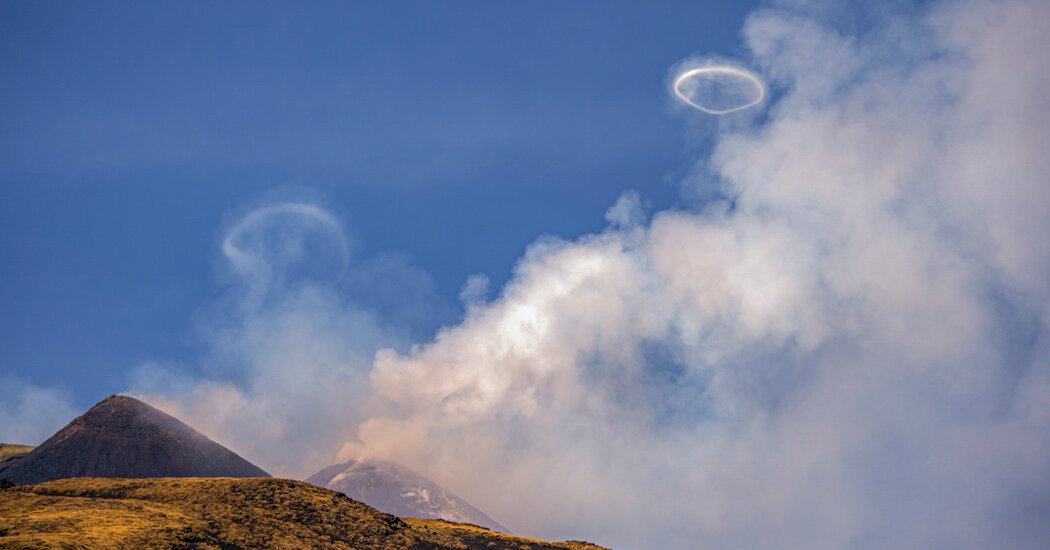For just over a week, Mt. Etna, one of Europe’s most active volcanoes, has been spewing circular, mostly white smoke rings into the skies over Sicily.
It’s not the first time Mt. Etna has enchanted onlookers with its puffing (it’s been dubbed the Gandalf of volcanoes, after the pipe-puffing wizard in “Lord of the Rings.”) But experts there say this month Etna “has broken all previous records” with the frequency of the rings, according to Boris Behncke, a volcanologist at the National Institute of Geophysics and Volcanology of Catania, who posted about the phenomenon on Facebook.
The rings, known as volcanic vortex rings, appeared earlier this month after a small vent opened on the northwest border of the Southeast crater. The phenomenon occurs when enough pressure builds up so that magma inside the crater propels condensed gases, predominantly water vapor, through the vent.
In this case, the vent is perfectly circular, making for particularly perfect rings. “It is bellissimo,” said Simona Scollo, another volcanologist at the INGV Etna Observatory in Catania, using the Italian word for beautiful. Ms. Scollo copublished a study on the dynamics of volcanic vortex rings last year in the journal Scientific Reports.
But, she said, the activity does not mean that Mt. Etna is going to erupt in a particularly spectacular way. “No, no, no,” she said.
During a telephone interview Tuesday, she said that the mechanism for the smoke rings was similar to how dolphins blow bubble rings. “They compress the water in their mouths, and using their tongue they push it out of their mouths and create such a pressure that it forms a ring,” she said.
Depending on weather conditions, the rings hang in the air anywhere from one to 10 minutes, according to the study. “If there is turbulence they fall apart more quickly,” she said.
Interviewed in The New York Times last year, Ms. Scollo said the study hoped to better understand how volcanoes functioned, “not only when they create a disaster for people or when they are very dangerous,” but in calmer times, too.
The new vent in the volcano has been spewing hundreds of rings, but another opening on the volcano has also been spewing rings, albeit more spaced out, since last year.
The phenomenon was first recorded on Etna in 1724, followed by periodic sightings, most recently last year, and quite spectacularly in 2000.
According to the description for its 2013 inscription as a UNESCO World Heritage site, Mt. Etna is “the highest Mediterranean island mountain and the most active stratovolcano in the world.”
“No volcano on earth produces as many volcanic vortex rings as Etna, we knew this for some time,” noted Mr. Behncke.
Mt. Etna isn’t the only volcano where the phenomenon has been registered. Volcanic vortex rings have been puffed by a number of volcanoes worldwide, from Momotombo in Nicaragua to ash-spewing plane stopper Eyjafjallajökul in Iceland, to Mt. Redoubt in Alaska to another active Italian volcano, Stromboli.
Ms. Scollo said that the activity from the new vent was slowing down. And it could end altogether.
“It can stop because the properties of the conduit that allowed for the formation of these volcanic vortex rings can change, maybe with obstructions,” she said. Or the amount of gas within the conduit could decrease, she added.




